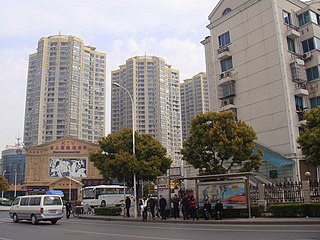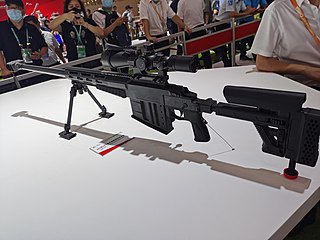
A playwright or dramatist is a person who writes plays.
Bourgeois liberalization is a term used by the Chinese Communist Party to refer to either the prevalent political orientation of Western representative democracy or mainstream Western popular culture. The late 1980s saw the first major usage of the term when a number of campaigns, such as the Anti-Spiritual Pollution Campaign, against bourgeois liberalism were initiated lasting until the early 1990s. The term is in active use in Chinese politics, with the Communist Party's Constitution stating party objectives include "combat[ing] bourgeois liberalization" in line with the four cardinal principles. According to the Chinese Communist Party, the concept of bourgeois liberalization was first proposed by Deng Xiaoping, the paramount leader of China, in early 1980s.

A theatre in the round, arena theatre, or central staging is a space for theatre in which the audience surrounds the stage.

The history of Irish theatre begins in the Middle Ages and was for a long time confined to the courts of the Gaelic and "Old English" – descendants of 12th-century Norman invaders – inhabitants of Ireland. The first theatre building in Ireland was the Werburgh Street Theatre, founded in 1637, followed by the Smock Alley Theatre in 1662.
Highland High School is a four-year public secondary school in Pocatello, Idaho, part of the Pocatello/Chubbuck School District#25. The school colors are red, black, and white and its mascot is a ram.

Amateur theatre, also known as amateur dramatics, is theatre performed by amateur actors and singers. Amateur theatre groups may stage plays, revues, musicals, light opera, pantomime or variety shows, and do so for the social activity as well as for aesthetic values. Productions may take place in venues ranging from the open air, community centres, or schools to independent or major professional theatres.

Wangjing subdistrict is a subdistrict office in Chaoyang district, Beijing. It borders Donghu Subdistrict to the north, Laiguangying Area and Datun Subdistrict to the west, Jiangtai area and Jiuxianqiao Subdistrict to the east, and Taiyanggong area to the south.

"Undone – The Sweater Song" is a song by the American alternative rock band Weezer, released on the band's self-titled 1994 debut album. It was released as their debut single in 1994.
The Modoc Northern Railroad is a defunct railroad company that operated over 160 miles (260 km) of track in northeastern California and southern Oregon and was based in Tulelake, California. The railroad connected Klamath Falls to Alturas, California, and Lakeview, Oregon, to Alturas, California. The railroad shipped mostly timber products and some perlite from the mine and mill near Lakeview.
Yvonne Latty is an American journalist, author, filmmaker and professor at New York University’s Arthur L. Carter Journalism Institute. She has traveled the country to speak on subjects including race to writing, and is also a Leeway Foundation Fellow.
Menksoft is an IT company in Inner Mongolia, who developed Menksoft Mongolian IME, the most widely used Mongolian language input method editor (IME) in Inner Mongolia.
Tom Konyves is a Canadian poet, video producer, educator and a pioneer in the field of videopoetry. He teaches creative visual writing at the University of the Fraser Valley.

Larry Catá Backer is a Cuban-American legal scholar and professor of law and international affairs. He holds a professorship at the Penn State University, and is the W. Richard and Mary Eshelman Faculty Scholar Professor of Law and International Affairs, Penn State Law and School of International Affairs, Pennsylvania State University (2001–), Ashgate Publishing Globalization Law & Policy Series editor (2010–), and the executive director of the Washington-based NGO Coalition for Peace and Ethics (2006–).
The Red Wa is the most powerful organized crime gang in Thailand. The Red Wa come from Burma and they are associated with the United Wa State Army. They are composed of people from the Wa ethnic group and they work together with Chinese organized criminals in the drug trade. The Red Wa control the methamphetamine trade in Thailand and neighboring countries and are also known for being involved in the trafficking and sale of other drugs, mainly heroin. Although they primarily focus on drug trafficking, groups associated with the United Wa State Army have also been involved in other crimes in order to protect their territory.
Handicraft markets in Hong Kong provide a platform for artists and craftspeople to show or sell their original artistic works. They are growing in range and popularity, but remain restricted by the availability of venues.

Xinwu District is one of five urban districts of Wuxi, Jiangsu Province, People's Republic of China.
Johny ML is an Indian culture critic, art curator and writer based in New Delhi.
The 8th Division is a division of the Xinjiang Production and Construction Corps (XPCC) distributed over Shihezi and Karamay cities, Manas and Shawan counties, Xinjiang Uygur Autonomous Region, China. It is an economic and paramilitary unit formed in 1953 from the former 26th Infantry Division of the 9th Army of the 22rd Corps of the PLA. The 8th Agricultural Construction Division was approved and renamed to the present 8th Division of the XPCC in 2012. The division is composed of 14 regiments, and headquartered in Shihezi City, it merges work in one official with Shihezi City. The Shihezi Reclamation Area of the 8th Division has an area of 5,851 square kilometers with a total population of 696,900 and a permanent population of 661,300, of that, the Shihezi City has an area of 460 square kilometers with a total population of 448,100 and a permanent population of 437,900. In the year of 2018, GDP of the 8th Division was CN¥54.85 billion, and the GDP per capita CN¥82,584 (US$12,480).
Song of Youth is a novel created by Chinese contemporary writer Yang Mo, published in 1958.

The QBU-201 is a type of bolt-action anti-materiel rifle designed and manufactured by Chinese company Norinco. The weapon is chambered with improved 12.7×108mm high-precision ammunition in a 5-round box magazine. The rifle features a free-floating barrel, Picatinny rail, dual-chamber compensator, and a shoulder stock with a retractable recoil reducer.








